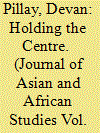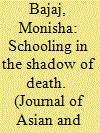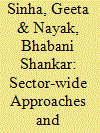| Srl | Item |
| 1 |
ID:
082689


|
|
|
|
|
| Publication |
2008.
|
| Summary/Abstract |
By 1925, 30 years after Kenya became a British colony, there were no high schools for Africans in the colony. In 1926, the Africans decided to build their own high schools through their Local Native Councils (LNCs) but the Government refused to sanction the building of the schools and this led to a protracted struggle. The Kiambu LNC's abortive high school at Githunguri is used as a case study to examine not only why the Government vetoed the building of the schools, but also to show how this greatly undermined the expansion of African higher education in subsequent years.
|
|
|
|
|
|
|
|
|
|
|
|
|
|
|
|
| 2 |
ID:
082686


|
|
|
|
|
| Publication |
2008.
|
| Summary/Abstract |
The 2006 South African local election results confirm the approximately two-thirds support the African National Congress (ANC)-led Alliance - with the Congress of SA Trade Unions (COSATU) and the SA Communist Party (SACP) - received from those who voted in previous elections, a level of support that is also consistently reflected among COSATU members in surveys held during 1994, 1998 and 2004.1 However, the low voter turnout means less than a quarter of all eligible voters voted for the ANC. As tensions between the ANC leadership under Thabo Mbeki and its working class allies mounted, this should ordinarily have presented an opportunity to build a Left alternative among a disgruntled working class majority - except that the basis for such an alternative, organized workers, seem resistant to an independent `working class politics'. Instead, they put all their energies into replacing the Mbeki leadership with that of his deputy, Jacob Zuma. By remaining within the Alliance, are the increasingly outspoken COSATU and SACP leadership being constrained by a relatively conservative union membership, arguably one of the beneficiaries of the democratic transition; or are workers merely responding to signals from a (largely compromised) leadership that `working class hegemony' can only be realized through a `popular-democratic' politics within the Alliance
|
|
|
|
|
|
|
|
|
|
|
|
|
|
|
|
| 3 |
ID:
082687


|
|
|
|
|
| Publication |
2008.
|
| Summary/Abstract |
This article explores how Zambian youth encounter HIV/AIDS in their schools and communities, and presents ways in which they demonstrate their agency in creating new language, identities, and self-conceptions in response to these encounters. Utilizing qualitative interviews, participant observation, and student diaries, this study suggests that the role and delivery of schooling must be re-examined given high teacher mortality, teacher misinformation, and young people's exposure to the disease outside of schools. Students' diverse experiences in and outside of school shape their knowledge and beliefs about HIV/AIDS in a time when all social institutions in Zambia have been affected by the disease
|
|
|
|
|
|
|
|
|
|
|
|
|
|
|
|
| 4 |
ID:
082688


|
|
|
|
|
| Publication |
2008.
|
| Summary/Abstract |
The article aims to provide a brief overview of the gender perspective in the Sector-wide Approaches (SWAp) and its ability to integrate gender equality concerns in education in Ghana. This approach has been strategically adopted by various aid agencies as an effective and efficient tool to ensure mainstreaming gender in different fields. In this article, we will try to analyse some of the ways in which mainstreaming gender has taken place through SWAp in the field of education in Ghana. It analyses the extent to which SWAp as a strategy has been able to mainstream gender in education in Ghana.
|
|
|
|
|
|
|
|
|
|
|
|
|
|
|
|
| 5 |
ID:
082685


|
|
|
|
|
| Publication |
2008.
|
| Summary/Abstract |
Socio-environmental marketing practices have increased drastically in the last decade following the rising environmental consciousness worldwide. This research examines landscaping adoption by organizations in two developing countries in Asia and Africa (namely Malaysia and Nigeria), and the key dimensions of facilitators of adoption. Factor and discriminant analyses were conducted on the data collected from these organizations. The findings of the research are that economic climate, governmental intervention, competitive development, public scrutiny, favourable management attitude and intention, relative advantage, compatibility and ease of use are important factors of socio-environmental marketing adoption by the participating firms.
|
|
|
|
|
|
|
|
|
|
|
|
|
|
|
|